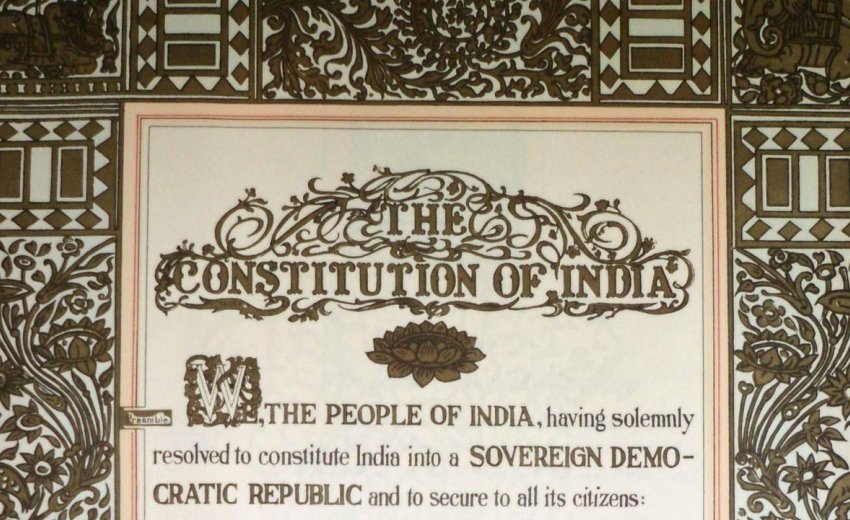A common fallacy propagated amongst Sikhs is that the Indian Constitution includes Sikhs in the definition of Hindus. The write-up aims to dispassionately analyse this view.
The contention swirls around Article 25 of the Indian constitution, which reads as follows:
25. Freedom of conscience and free profession, practice and propagation of religion
(1) Subject to public order, morality and health and to the other provisions of this Part, all persons are equally entitled to freedom of conscience and the right freely to profess, practise and propagate religion.
(2) Nothing in this article shall affect the operation of any existing law or prevent the State from making any law
(a) regulating or restricting any economic, financial, political or other secular activity which may be associated with religious practice;
(b) providing for social welfare and reform or the throwing open of Hindu religious institutions of a public character to all classes and sections of Hindus Explanation I The wearing and carrying of kirpans shall be deemed to be included in the profession of the Sikh religion Explanation II In sub clause (b) of clause reference to Hindus shall be construed as including a reference to persons professing theSikh, Jaina or Buddhist religion, and the reference to Hindu religious institutions shall be construed accordingly
Read 25 (2) (b) closely again – the article extends the provisions regarding Hindu religious institutions to Sikh religious institutions. It specifically mentions “Sikh Religion” as a term TWICE. 25 (b) is more about extending some legal provisions as applicable to Hindus; to Sikh, Buddhist and Jaina ‘Religions’.
Buddhism is recognized the world over as a separate religion, and so is Jain religion; by bundling Sikh Religion with them, the Constitution of India in fact provides it the same legal rights.
In fact, the Constitution of India does not define any religion, not even Hinduism. India’s Constitution does not give a definition of the term Hindu, but it does define to whom the ‘Hindu Law’ applies. For example, The Hindu Marriage Act of 1955 (which by the way is not the Constitution), by stipulating in Section 2 that the Act applies:
(a) to any person who is a Hindu by religion in any of its forms and developments, including a Virashaiva, a Lingayat or a follower of the Brahmo, Prarthana or Arya Samaj,
(b) to any person who is a Buddhist, Jain or Sikh by religion, and
(c) to any other person domiciled in the territories to which this Act extends who is not a Muslim, Christian, Parsi or Jew by religion
Here again we see that though Hindu Marriage Act provides for laws related to marriages of Hindus but extends the provisions to ‘Sikhs by religion’.It does acknowledge Sikhs as a separate religion.
The subsequent Anand Marriage Act provides further rights to Sikhs for a distinct procedure that is not in line with Hindu procedures.
Jawaharlal Nehru was asked to clarify the situation with regard to Jainism as a separate religion by the Jain community. The Position was officially recognized in a letter No. 23/94/50 P. M.S. New Delhi dated- /3/50 from the Principal Private Secretary of the Prime-Minister to Shri S. G. Patil representative of the Jain deputation which waited on the Prime Minister Sh. Nehru on 25th January, 1950. It reads:-
“ With reference to the deputation of certain representatives of the Jain who met the Prime Minister on the 25th January, 1950, I am desired to say that there is no cause whatever for Jains to have any apprehension regarding the future of their religion and community. Your deputation drew attention to the article 25 of constitution. The constitution only lays down a rule for limited purpose of the provision in the Article and as you will notice, it mentions not only Jains but also Buddhists and Sikhs. It is clear that Buddhists are not Hindus. There is therefore no reason for thinking that Jains are considered as Hindus. It is true that Jains are in some ways closely like Hindus and have many customs in common but there is no doubt that they are a distinct religious community and the constitution does not in any way affect this well recognized position.
We read the fine-print and we notice that they do not extend the definition of Hindu to Sikhs, but the applicability of the act to “Sikh by religion”.
In conclusion:
Article 25 gives all ‘religions’ certain rights: and subsequently, the word ‘Sikh religion’ specifically gives Sikhism the status of a religion. Hindu Marriage Act provides for laws related to marriages of Hindus; but extends the provisions to ‘Sikhs by religion’, further the Anand Marriage Act expressly acknowledges the separate procedures of Sikhs.
Readers are free to find flaws in the above argument and enlighten me. But the objections need to be legally tenable and not emotional in nature.
Note: All italics and colours are edited in by the author for the purpose of highlighting, and are not present in the original legal documents.
